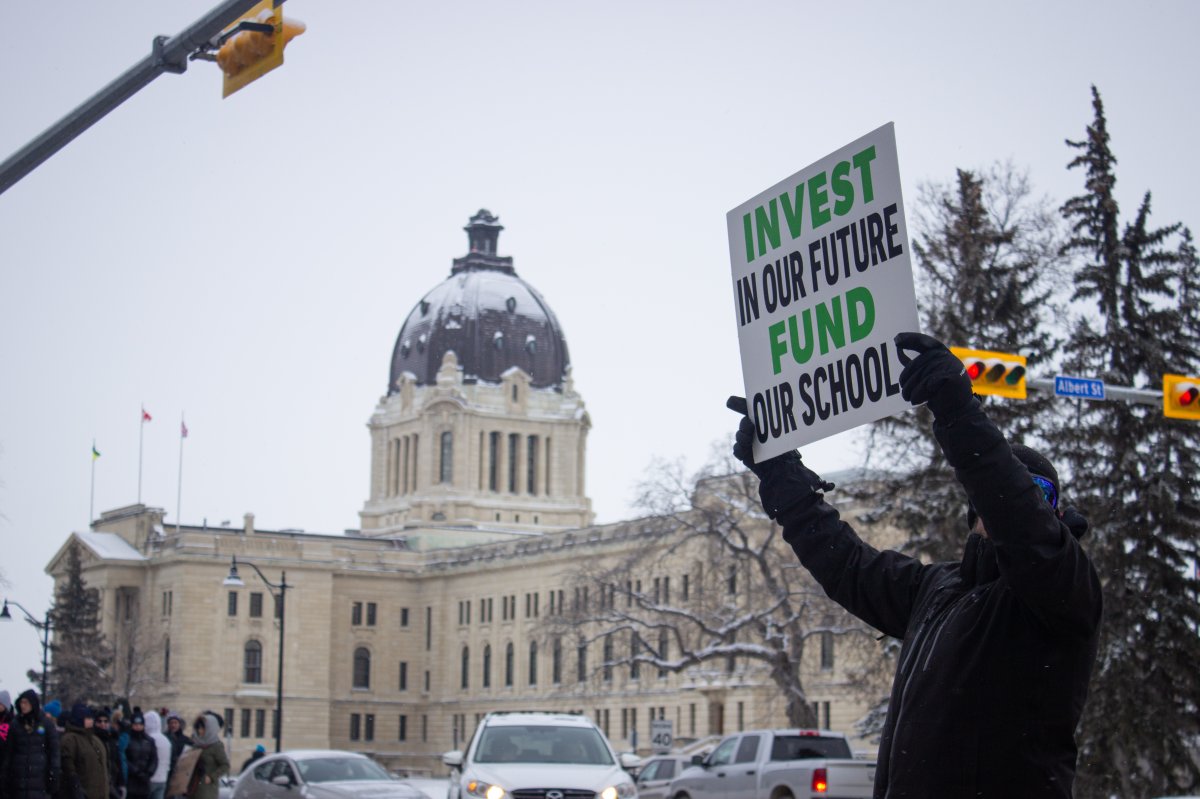The Saskatchewan Teachers’ Federation and the provincial government find themselves in a stalemate in the midst of contract negotiations, but it isn’t the first time the two sides have been at odds.

Thursday marked the beginning of rotating strikes around the province, while two one-day province-wide strikes have been held throughout January.
STF is attempting to add classroom size and complexity to the collective bargaining agreement, while the provincial government remains adamant the issues should be addressed by local school boards.
“The goal is to get back to the table and negotiate,” STF president Samantha Becotte said. “There are no actions that are off the table. We are really considering anything to look at, ‘what is it going to take to get government back to the table, ready to negotiate’?”
For Saskatchewan education minister Jeremy Cockrill, negotiating on classroom complexity is an issue the government will not budge on.
“We can’t do that in a provincially bargained agreement because what that would essentially do is take the role of locally elected school boards which we have 27 of across the province and give that to union leadership,” Cockrill said. “We’re not prepared to do that. We’re not prepared to take the local voice out of education.”
STF’s history of job action
Since the STF’s inception in 1933, the union has enacted job actions and sanctions four times including this winter, while continuously negotiating contracts at different points throughout the decades.
- RCMP arrests alleged hitmen accused of killing B.C. Sikh leader
- Fall COVID-19 vaccine guidelines are out. Here’s what NACI recommends
- Some 2019 candidates ‘appeared willing’ to engage with foreign interference: Hogue inquiry
- Thousands of Canada’s rail workers have a strike mandate. What happens now?
Through the early ’70s and ’80s, bargaining primarily focused on equity, salary parity, pensions and benefits, including the ability to retire at any age after 30 years of eligible employment.
The first major display of frustration from the STF was in 1988, when thousands of teachers from across the province gathered in front of the legislature on Feb. 18 to protest a stalemate at the bargaining table.
Back in 1990 and 2000, teachers held a strike vote, but didn’t end up walking of the job as they continued to fight for the Saskatchewan Teachers retirement plan, same-sex benefits, supplemental unemployment benefits and an updated health plan.
In the fall of 2000, after a year of negotiating, teachers began work-to-rule action for six days in September, refusing to perform any work not related to classroom learning.
The government offered a 7.2 per cent wage increase over three years. The union wanted a total of 15.3 per cent over three years, which would align with wages in Manitoba and Alberta, plus a two-per-cent payroll equivalent raise in benefit allowances.
Members voted against a tentative contract in April of 2000, and voted in favour of sanctions two months later. By the end of October, another contract was reached, settling on 9.5 per cent over three years plus the two-per-cent boost to benefits.
A sanctions vote passed again in 2004, though no action occurred.
Perhaps the most notable job action in STF’s history came in 2011, when the there was a full-on strike. The strike lasted two days followed by an additional third walk-out day during salary negotiations.
Teachers were seeking a 12 per cent wage increase for the first year, and 16.3 per cent over three, to stay aligned with the prairie provinces. The government put forward 5.5 per cent over three years.
2011 was also the first time the STF halted extracurricular activities for two days.
“Teachers are committed to the students and the public they serve,” Gwen Dueck, the chief spokesperson for the Teachers’ Bargaining Committee at the time said. “They do not want to withdraw services, but this is an issue of fairness and valuing the professional role of teachers in ensuring the future of our province.”
Eventually an agreement was reached which saw an overall 6.82 to 10.89 per cent wage increase, with market adjustments to the wage grid to match B.C., Manitoba and Alberta as suggested by a mediator.
Back in 2019 and 2020, STF was moving towards different job actions including cutting extra curriculars. Plans were in motion, and the activities were set to be cut when the COVID-19 pandemic hit the province, and as a result, the provincial government and STF quickly came to a contract negotiation.
At the time, STF said they agreed to the offer despite it not being what they were looking for, because of the uncertainty of the pandemic.
Now, the two sides again find themselves at odds.
The common theme across the decades according to Becotte, is the government not responding to the needs of teachers and students.
“I think the common theme that we can see within all of the job actions is a result of government not coming to the table, ready to address the issues that teachers have been experiencing,” Becotte said.
Throughout contract negotiations over the last 40 years, salaries have always been a big discussion.
The STF is asking for a salary increase of two per cent annually plus the consumer price index average annual rate in Saskatchewan for each of the next four years.
And while salaries continue to be negotiated, the difference this time around is classroom size and complexity.
“The government isn’t willing to engage in conversations on really any topic that we have brought forward, but specifically unwilling to address teachers working conditions which we know impact students learning conditions,” Becotte said.
Both the provincial government and the STF say they’re waiting on the other to come back to the bargaining table.








Comments